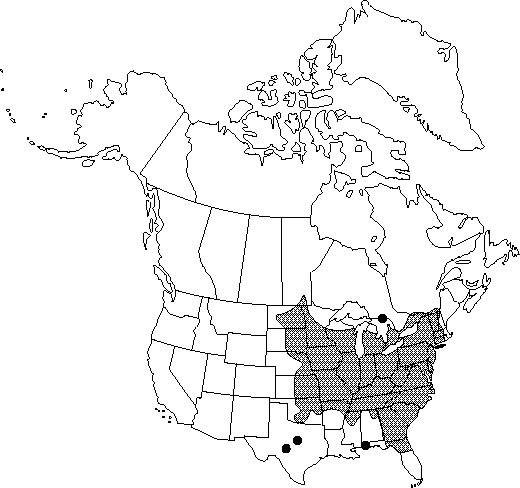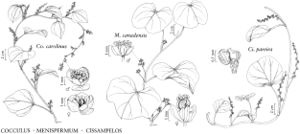Difference between revisions of "Menispermum canadense"
Sp. Pl. 1: 340. 1753.
FNA>Volume Importer |
imported>Volume Importer |
||
| (7 intermediate revisions by 2 users not shown) | |||
| Line 13: | Line 13: | ||
}}{{Treatment/ID/Special_status | }}{{Treatment/ID/Special_status | ||
|code=F | |code=F | ||
| − | |label= | + | |label=Illustrated |
}} | }} | ||
|basionyms= | |basionyms= | ||
| Line 24: | Line 24: | ||
}}<!-- | }}<!-- | ||
| − | --><span class="statement" id="st- | + | --><span class="statement" id="st-undefined" data-properties=""><b>Vines </b>or lianas, vines twining, to ca. 5 m; rhizomes to 1 cm diam. <b>Leaves</b> peltate with petiole inserted to 11 mm from margin, rarely not peltate; petiole to 20 cm. <b>Leaf</b> blade ovate or nearly orbiculate, rarely reniform, to 23 × 24 cm, membranous; venation 7-12. <b>Inflorescences</b> to 18 cm; rachis glabrous or sparsely pilose. <b>Flowers</b>: sepals (4-)5-8, ovate, elliptic, or obovate, 1-4 × 0.4-1.8 mm, glabrous or sparsely pilose; petals 4-12, elliptic to nearly orbiculate or obovate, 0.6-2 × 0.6-2 mm, margins slightly involute, glabrous. <b>Staminate</b> flowers: stamens to 4 mm. <b>Pistillate</b> flowers: staminodes to 0.8(-1.5) mm; pistils 2-4, to 1.4 mm. <b>Drupes</b> black or bluish black, 8-13 mm diam., often glaucous. <b>2n</b> = 52.</span><!-- |
-->{{Treatment/Body | -->{{Treatment/Body | ||
| Line 31: | Line 31: | ||
|elevation=0-700 m | |elevation=0-700 m | ||
|distribution=Man.;Ont.;Que.;Ala.;Ark.;Conn.;Del.;D.C.;Fla.;Ga.;Ill.;Ind.;Iowa;Kans.;Ky.;Md.;Mass.;Mich.;Minn.;Miss.;Mo.;Nebr.;N.H.;N.J.;N.Y.;N.C.;N.Dak.;Ohio;Okla.;Pa.;R.I.;S.C.;S.Dak.;Tenn.;Tex.;Vt.;Va.;W.Va.;Wis. | |distribution=Man.;Ont.;Que.;Ala.;Ark.;Conn.;Del.;D.C.;Fla.;Ga.;Ill.;Ind.;Iowa;Kans.;Ky.;Md.;Mass.;Mich.;Minn.;Miss.;Mo.;Nebr.;N.H.;N.J.;N.Y.;N.C.;N.Dak.;Ohio;Okla.;Pa.;R.I.;S.C.;S.Dak.;Tenn.;Tex.;Vt.;Va.;W.Va.;Wis. | ||
| − | |discussion=<p>The fruit of Menispermum canadense is thought to be poisonous. This species is sometimes grown as an ornamental.</p><!-- | + | |discussion=<p>The fruit of <i>Menispermum canadense</i> is thought to be poisonous. This species is sometimes grown as an ornamental.</p><!-- |
| − | --><p>Some Native American tribes used Menispermum canadense medicinally as dermatological, gastrointestinal, gynecological, and venereal aids, and as remedies for various other complaints (D. E. Moerman 1986).</p> | + | --><p>Some Native American tribes used <i>Menispermum canadense</i> medicinally as dermatological, gastrointestinal, gynecological, and venereal aids, and as remedies for various other complaints (D. E. Moerman 1986).</p> |
|tables= | |tables= | ||
|references= | |references= | ||
| Line 41: | Line 41: | ||
-->{{#Taxon: | -->{{#Taxon: | ||
name=Menispermum canadense | name=Menispermum canadense | ||
| − | |||
|authority=Linnaeus | |authority=Linnaeus | ||
|rank=species | |rank=species | ||
| Line 55: | Line 54: | ||
|publication title=Sp. Pl. | |publication title=Sp. Pl. | ||
|publication year=1753 | |publication year=1753 | ||
| − | |special status=Endemic; | + | |special status=Endemic;Illustrated |
| − | |source xml=https:// | + | |source xml=https://bitbucket.org/aafc-mbb/fna-data-curation/src/2e0870ddd59836b60bcf96646a41e87ea5a5943a/coarse_grained_fna_xml/V3/V3_645.xml |
|genus=Menispermum | |genus=Menispermum | ||
|species=Menispermum canadense | |species=Menispermum canadense | ||
| − | |||
| − | |||
| − | |||
| − | |||
| − | |||
| − | |||
| − | |||
| − | |||
| − | |||
| − | |||
| − | |||
| − | |||
| − | |||
| − | |||
| − | |||
| − | |||
| − | |||
| − | |||
| − | |||
| − | |||
| − | |||
| − | |||
| − | |||
| − | |||
| − | |||
| − | |||
| − | |||
| − | |||
| − | |||
| − | |||
| − | |||
| − | |||
| − | |||
| − | |||
| − | |||
}}<!-- | }}<!-- | ||
-->[[Category:Treatment]][[Category:Menispermum]] | -->[[Category:Treatment]][[Category:Menispermum]] | ||
Latest revision as of 21:50, 5 November 2020
Vines or lianas, vines twining, to ca. 5 m; rhizomes to 1 cm diam. Leaves peltate with petiole inserted to 11 mm from margin, rarely not peltate; petiole to 20 cm. Leaf blade ovate or nearly orbiculate, rarely reniform, to 23 × 24 cm, membranous; venation 7-12. Inflorescences to 18 cm; rachis glabrous or sparsely pilose. Flowers: sepals (4-)5-8, ovate, elliptic, or obovate, 1-4 × 0.4-1.8 mm, glabrous or sparsely pilose; petals 4-12, elliptic to nearly orbiculate or obovate, 0.6-2 × 0.6-2 mm, margins slightly involute, glabrous. Staminate flowers: stamens to 4 mm. Pistillate flowers: staminodes to 0.8(-1.5) mm; pistils 2-4, to 1.4 mm. Drupes black or bluish black, 8-13 mm diam., often glaucous. 2n = 52.
Phenology: Flowering spring–summer.
Habitat: Deciduous woods and thickets, along streams, bluffs and rocky hillsides, fencerows, shade tolerant
Elevation: 0-700 m
Distribution

Man., Ont., Que., Ala., Ark., Conn., Del., D.C., Fla., Ga., Ill., Ind., Iowa, Kans., Ky., Md., Mass., Mich., Minn., Miss., Mo., Nebr., N.H., N.J., N.Y., N.C., N.Dak., Ohio, Okla., Pa., R.I., S.C., S.Dak., Tenn., Tex., Vt., Va., W.Va., Wis.
Discussion
The fruit of Menispermum canadense is thought to be poisonous. This species is sometimes grown as an ornamental.
Some Native American tribes used Menispermum canadense medicinally as dermatological, gastrointestinal, gynecological, and venereal aids, and as remedies for various other complaints (D. E. Moerman 1986).
Selected References
None.
